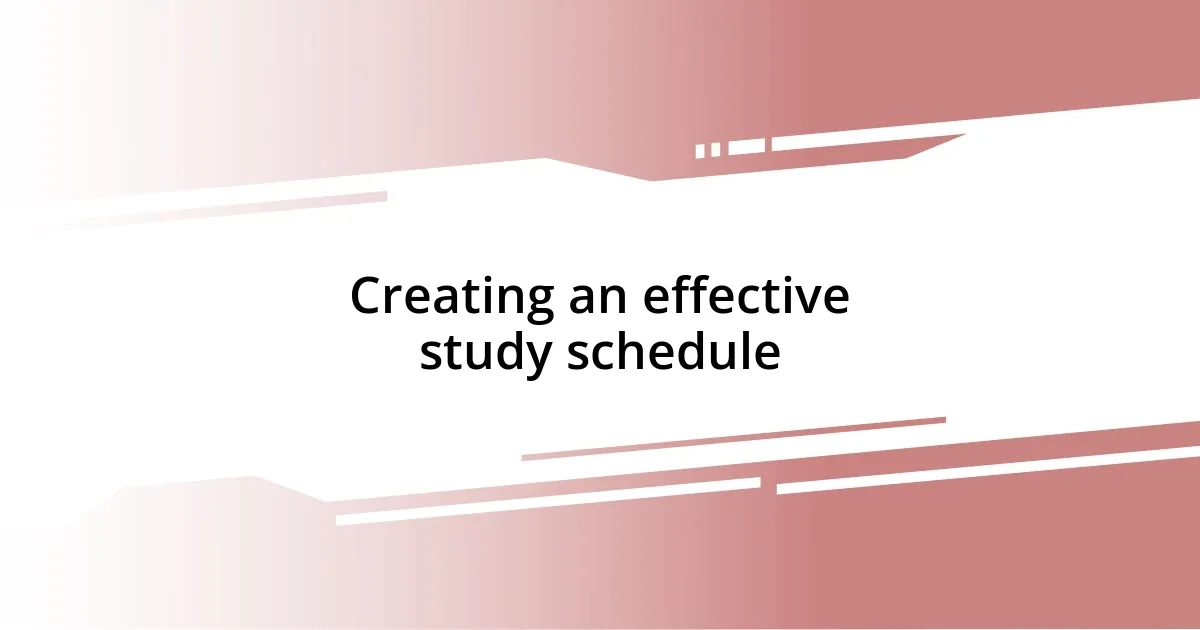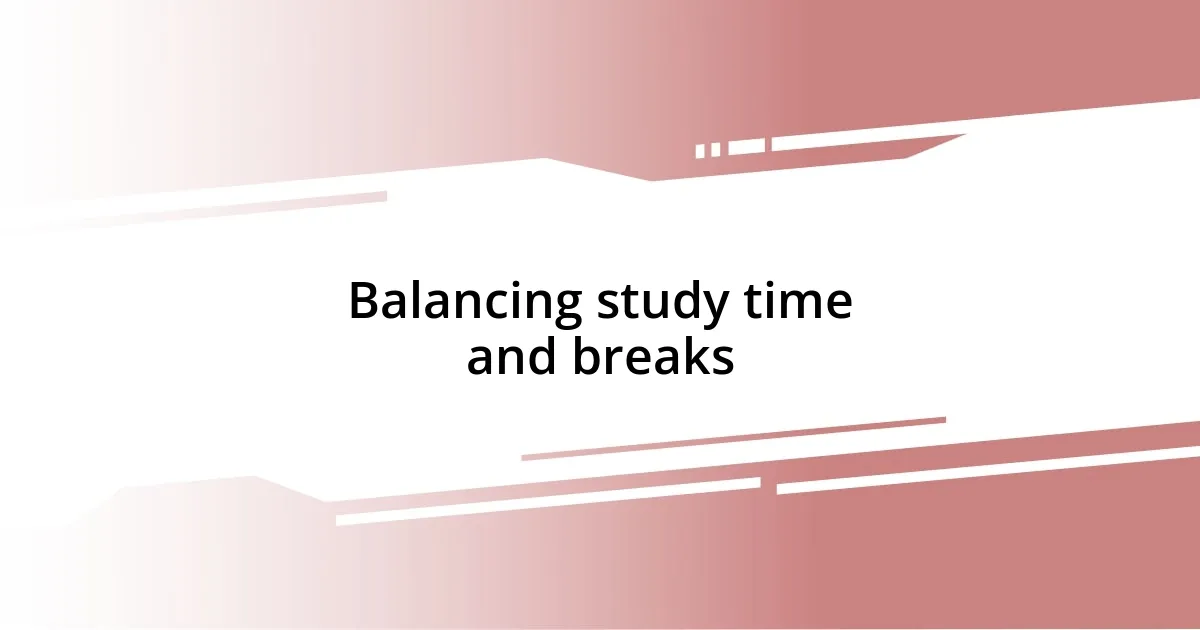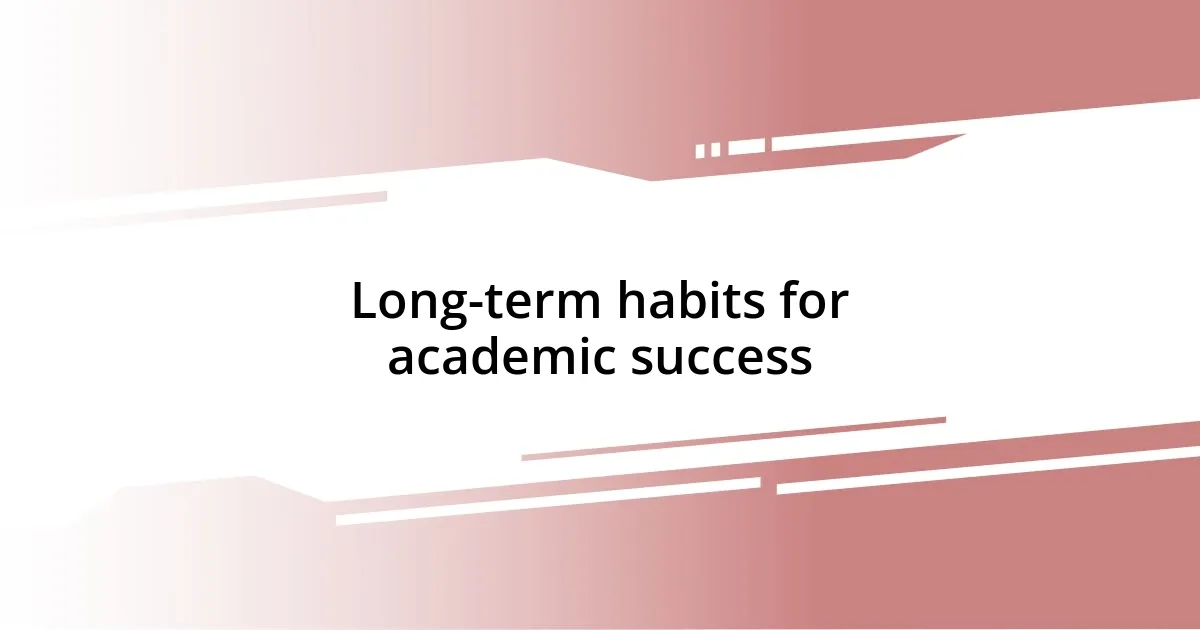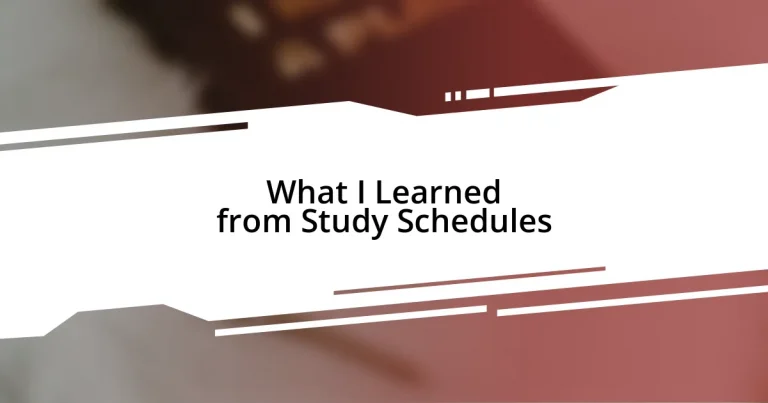Key takeaways:
- Study schedules provide structure, reduce anxiety, and enhance accountability through shared goals.
- Incorporating breaks, such as the Pomodoro Technique, significantly improves focus and retention.
- Flexibility in study techniques, like thematic study days or changing environments, enhances engagement and understanding.
- Regular evaluation and small adjustments to study routines can lead to increased productivity and a more enjoyable learning experience.

Understanding study schedules benefits
One of the most significant benefits of study schedules is that they promote a sense of structure in our learning. I remember the first time I created a detailed study plan; I felt a wave of relief wash over me. It was as if the chaos of my notes transformed into a clear path, guiding me towards my goals.
Additionally, a well-structured study schedule helps reduce anxiety. When I was preparing for exams, I often felt overwhelmed by the sheer volume of material. However, breaking it down into manageable chunks made everything feel more achievable. Have you ever looked at a huge task and thought, “Where do I even start?” A study schedule provides that starting point, paving the way for small victories along the way.
Finally, study schedules enhance accountability. I vividly recall sharing my study goals with a friend; it turned into an informal study group. Knowing someone else was aware of my plans pushed me to stick to them. Isn’t it interesting how we often perform better when we know someone is counting on us? That’s the power of commitment, and a study schedule reinforces it beautifully.

Creating an effective study schedule
Creating an effective study schedule requires a thoughtful approach tailored to individual needs. When I first started organizing my study sessions, I experimented with different formats until I discovered what worked best for me. I typically broke my study hours into blocks, mixing subjects to keep my mind fresh. This variety not only made the process more enjoyable, but also helped me retain information better.
Here are key elements I found valuable when designing my schedule:
- Set Specific Goals: Identify what topics you want to cover each session.
- Be Realistic: Allocate time based on your concentration levels; don’t cram too much.
- Incorporate Breaks: Short breaks between study blocks can refresh your mind.
- Stay Flexible: Life happens; allow for adjustments without guilt.
- Reward Yourself: Plan small rewards for achieving your study milestones to stay motivated.
In my experience, it was crucial to have a blend of discipline and flexibility. Once, when I meticulously planned for an exam but faced unexpected interruptions, I discovered that adapting my schedule taught me resilience. This shift not only alleviated stress but also reinforced the notion that sometimes, being too rigid can backfire. Embracing this balance made my study journey more fulfilling and less daunting.

Balancing study time and breaks
Balancing study time and breaks is essential for maintaining focus and effectiveness. I’ve personally found that studying without breaks leads to fatigue and diminished concentration. It’s like running a marathon without stopping for water; eventually, you hit a wall. A simple technique that worked wonders for me was the Pomodoro Technique, where I studied for 25 minutes and took a 5-minute break. This rhythm created a refreshing flow, making me feel more energized and engaged when I sat back down to study.
In my journey of creating study schedules, I learned that the quality of study time often matters more than the quantity. There were days when I pushed myself to study for hours on end without proper breaks, only to realize that my retention was poor. A memorable moment was when I decided to take a longer break—about 15 minutes—after every hour of study. I stepped outside, breathed in the fresh air, and even grabbed a snack. That shift made a significant difference, as I returned to my study with a clear mind and renewed focus.
To illustrate the importance of breaks, I compared two scenarios: one with well-structured study sessions and regular breaks, and another with marathon study hours and minimal rest. The results were eye-opening, revealing how my productivity surged with the right balance.
| Scenario | Productivity Level |
|---|---|
| Structured Study with Breaks | High |
| Long Study Sessions without Breaks | Low |

Incorporating flexible study techniques
When I began experimenting with flexible study techniques, I stumbled upon the value of spontaneity in learning. Imagine this: I had a planned study session on mathematics but woke up feeling drained. Instead of forcing myself into a regimen, I switched gears and opted for a creative writing session that day. This not only lightened my mood but also sparked new ideas for my math problems. How often have we stuck rigidly to plans even when our minds crave a different direction? I’ve learned that embracing such pivots can lead to unexpected benefits.
One technique that significantly impacted my study routine was thematic study days. I remember designating Thursdays for group study, which was often less structured. We would dive into discussions about our subjects, bouncing ideas and clarifying doubts together. The relaxed format allowed for deeper conversations and connections. It made me wonder—how much are we missing by sticking to solitary study sessions? Those collective moments enriched my understanding tremendously and added an element of fun to the learning process.
Additionally, I found that mixing study environments could amplify my focus. A few times, I chose to study in coffee shops or libraries instead of my usual desk. Each setting brought its own energy, reinvigorating my motivation. One day, while immersed in a cozy café, I realized that changing my surroundings not only refreshed my mind but also helped me grasp challenging concepts more easily. Isn’t it fascinating how a new backdrop can transform our learning experience? Embracing flexibility in study techniques has taught me that sometimes, breaking free from the norm can yield the most rewarding insights.

Maximizing retention with study tools
I’ve discovered that incorporating study tools can greatly enhance retention, and one tool that stood out to me was flashcards. Initially, I viewed them as basic memory aids, but once I started using them actively, my retention skyrocketed. There was one night when I was cramming for a history exam, and I created flashcards for key events and dates. The simple act of writing them out helped cement the information in my mind, and as I shuffled through them, something clicked. I realized that engaging with the material in multiple ways—seeing it, writing it, and testing myself—made it stick.
Another tool that transformed my study sessions was mind mapping. At first, I was a bit skeptical about drawing doodles and connecting ideas, thinking it was a waste of time. But then, I tried it for a complex biology chapter full of concepts that intertwined. As I mapped out everything, I felt the confusion lift. It was as if I was pulling threads together to create a clear picture in my mind. Suddenly, I had a comprehensive overview that made recalling specific details much easier. Have you ever felt that ‘aha’ moment when everything comes together? That’s precisely what happened for me.
Lastly, I can’t emphasize enough the role of digital tools in my study arsenal. I started using apps like Anki for spaced repetition, which proved invaluable for long-term retention. One particular week, I was revising for a language exam, and I noticed that by reviewing vocabulary at spaced intervals, I was recalling words with ease. It’s almost as if the app was training my brain to recognize patterns, making the learning process less of a chore and more of an adventure. Have you ever thought about how technology can make studying feel less daunting? For me, embracing these study tools has been a game-changer in how I absorb and retain information.

Evaluating and adjusting your schedule
Evaluating your study schedule is essential for understanding what works and what doesn’t. I once had a schedule that felt perfectly planned out—until I realized I was constantly fighting against it. There was a week I tried to stick to studying for three hours straight, only to feel my attention slip away after the first hour. That’s when I learned the importance of checking in with myself and being honest about my focus and fatigue.
Adjustments can be game-changers in a study routine. For instance, I began tracking my productivity weekly and noticed that my most productive hours actually varied from day to day. On Wednesdays, I found myself buzzing with energy in the evenings, so I switched my heavier subjects to that time slot. Why hadn’t I looked at my energy levels earlier? Such tweaks sparked excitement in my studies and made dull tasks feel far more manageable.
It’s also vital to remember that change doesn’t have to be overwhelming. Some of my most effective adjustments were minor. One day, after feeling unmotivated to tackle my readings, I decided to break them into smaller, bite-sized segments throughout the day instead of cramming them in one go. This simple change had me eager to check off each small success, and I ended up retaining the material much better than I had before. How often do we underestimate the power of small adjustments? Evaluating and adapting your schedule can truly unlock a more enjoyable learning experience.

Long-term habits for academic success
Building long-term habits for academic success is something I’ve learned to prioritize over time. One of the most effective moves I made was to establish a consistent daily routine. At first, I resisted this idea, thinking, “Why not keep things spontaneous?” But as I incorporated specific study times into my day, I began to notice an increase in my focus. It was like training my brain to expect study sessions, and I felt more prepared and energized. Have you ever noticed how much easier it is to dive into studying when it feels like just another part of your day?
Another habit I found incredibly beneficial was setting specific, measurable goals for each study session. Initially, I’d simply tell myself, “I’ll study biology today,” but that wasn’t effective. Once I began breaking down topics into smaller goals, like “I’ll master the cell cycle” or “I’ll complete Chapter 4 questions,” my productivity soared. There was one week when I challenged myself to learn a chapter a day, and the satisfaction of ticking off those goals gave me a sense of accomplishment that fueled my motivation. It’s amazing how small victories can build momentum, don’t you think?
I also learned the value of reflection at the end of each study week. Taking a moment to evaluate what worked and what didn’t helped me refine my approach significantly. I remember a time when I felt disengaged after a long lecture. Instead of ignoring that feeling, I jotted down my reflections about it. This insight led me to seek out more interactive resources, which transformed my study sessions into engaging experiences. Reflecting isn’t just a task; it’s a powerful tool for personal growth. How often do you take time to look back and analyze your learning process? Making time for reflection can lead to continuous improvement and, ultimately, academic success.













